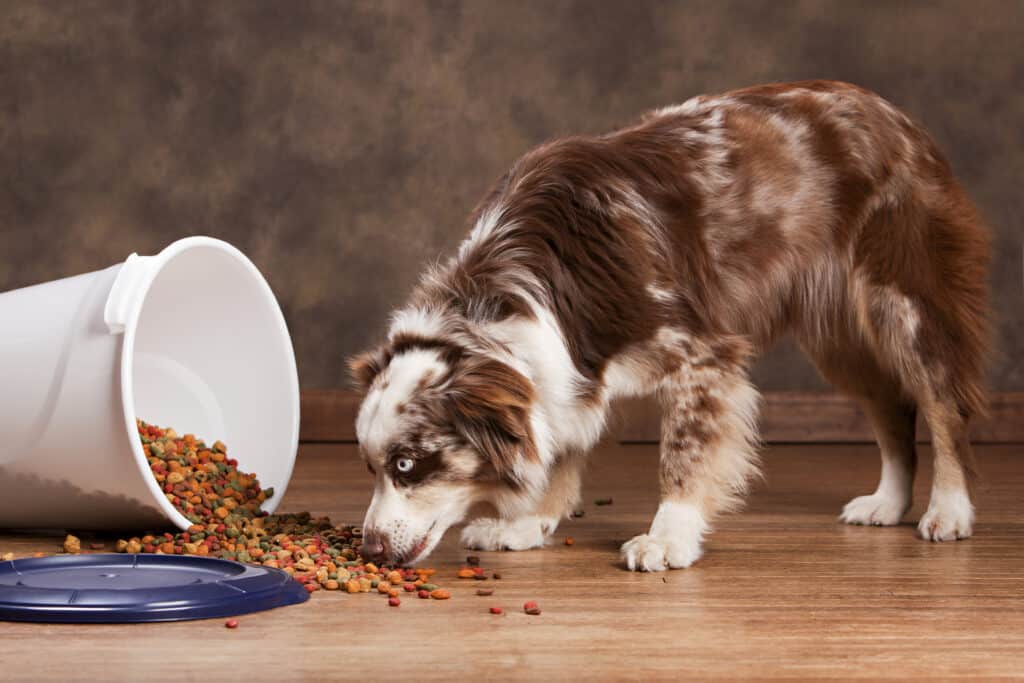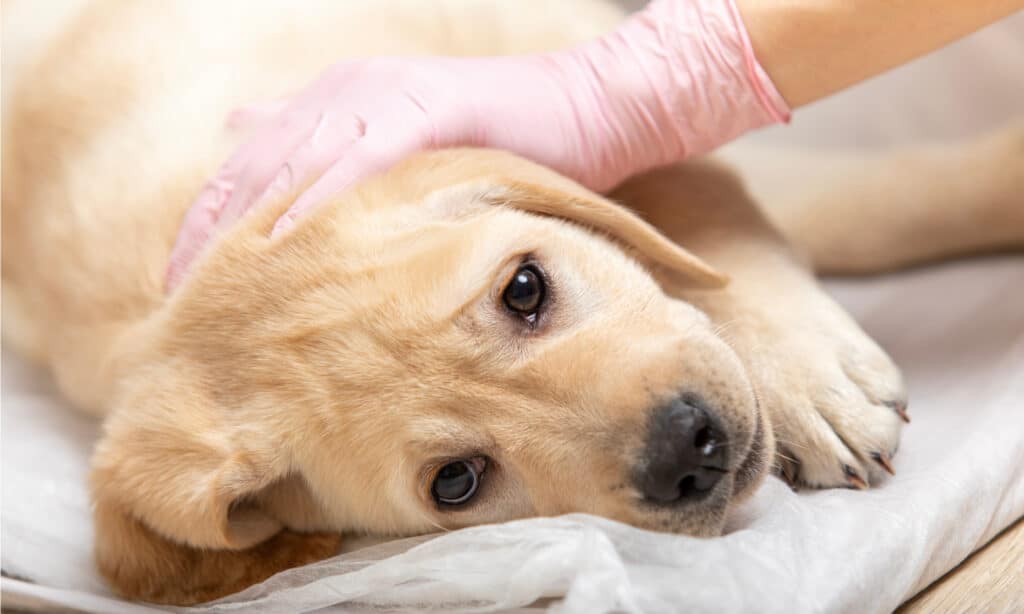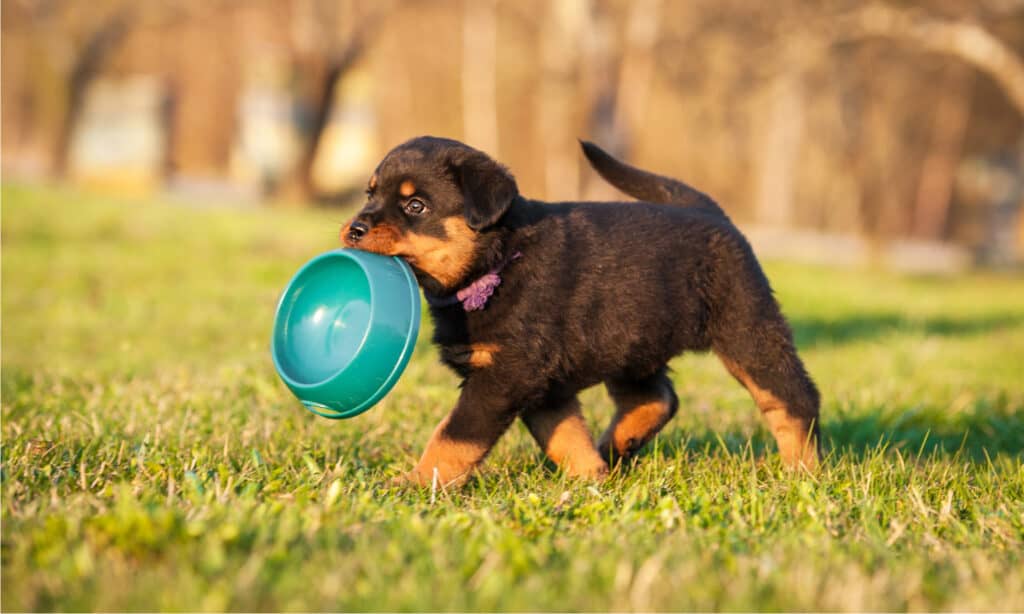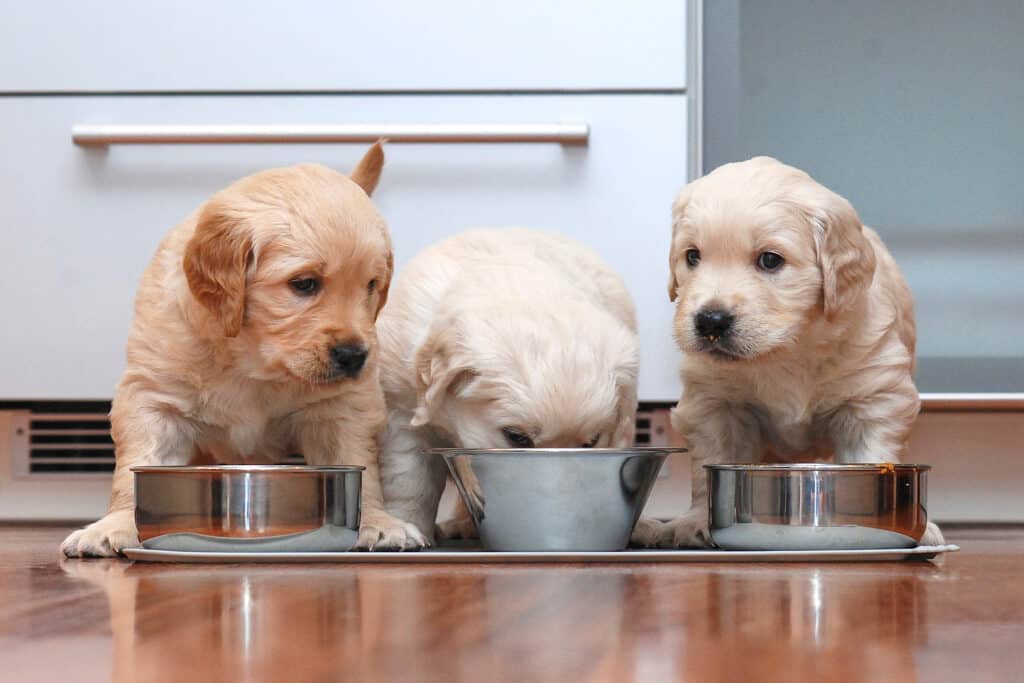It takes dogs around 8-10 hours to digest food on average. However, many factors can affect digestion time, including what they’ve eaten, if they’re hydrated, their age, health, activity levels, and genetics.
Whether your dog doesn’t seem to be digesting their food properly, or you’ve adopted a new pup and don’t know how much to feed them, I’m here to help!
In this article, we’ll discuss how long it takes a dog to digest food, symptoms of digestive issues, how many meals a dog should eat daily, and more!
How Long Does it Take for a Dog to Have an Empty Stomach?

Dogs shouldn’t go more than 12 hours without a meal.
©Michelle D. Milliman/Shutterstock.com
It takes a dog around 8-10 hours to completely digest its food and have an empty stomach. If they overeat, it can take longer.
Dogs shouldn’t go more than 12 hours without a meal, or they’ll begin to feel nauseated and extremely hungry.
Some factors that will help determine how long it takes your dog to digest their food include:
- Age: Puppies take less time to digest their food than adults, while seniors’ digestive systems slow down over time.
- Breed and genetics: Just like humans, some dogs have faster metabolisms than others. This comes down to their breed and other genetic factors.
- Daily exercise: Dogs who are incredibly active will process food faster and thus need to eat more food to stay healthy. Sedentary dogs need less food and have slower digestive systems.
- Diet: The more fillers in a food, the more time it’ll take your dog’s body to digest. The more water in the food, the faster your dog can digest it. Dogs typically digest canned food much more quickly than kibble.
- Hydration: If your dog is dehydrated, it will take them longer to digest food. Hydrated dogs digest food more quickly.
- Health: Dogs with poor gut health may process food either faster or slower than a healthy dog.
How to Know if Your Dog has a Digestive Issue

A veterinarian can advise you on treatments and dietary changes to help your dog’s digestive system function properly.
©Olya Maximenko/Shutterstock.com
If you think your dog is sick, please see a veterinarian. They can advise you on treatments and dietary changes to help your dog’s digestive system function properly.
The following symptoms indicate that your dog has a digestive problem:
- Vomiting
- Diarrhea
- Hard stools
- Constipation
- Stomach pain
- Gas
- Poops have a strong odor
- Dehydration
- Changes in appetite
- Sudden changes in weight
What About Things That Aren’t Digested?
Certain foods and other materials, such as household things your dog has chewed and swallowed, can’t be digested. These things will either come out whole in their poop or stay in the system, creating a blockage.
If your dog eats something and you don’t see it in its stool after, call your veterinarian for help. Dogs are known for eating things they shouldn’t, and sometimes x-rays reveal a scary amount of foreign material in the stomach!
Why Does My Dog Poop Right After Eating?
Many dogs will poop right after eating a meal. However, they aren’t pooping what they just ate–their digestive system cannot move that quickly.
Instead, their poop consists of food they ate 8-10 hours before, give or take, depending on the above factors.
This is your dog’s body’s way of making room to process the new food in its system. As more goes in, more needs to come out!
How Many Meals Should Dogs Eat a Day?

You must feed your dog the same amount of food; no matter how many meals your dog gets, stay consistent.
©Rita_Kochmarjova/Shutterstock.com
Dogs should eat at least two meals daily, but three is better. More is also okay!
The important thing is that you feed the same amount of food, no matter how many meals your dog gets, and that you stay consistent.
For instance, don’t feed three larger meals one day and two smaller meals the next. Talk with your veterinarian to figure out how much food your dog should eat daily, and break that down into meals–rather than feeding three meals of the same size as you would if feeding your dog twice.
Do Dogs Need Scheduled Meals?
Most dogs benefit from scheduled mealtimes, yes! Dogs thrive on routine throughout the day, and mealtime is an easy way to make this happen. They like knowing what to expect.
Free feeding can lead to your dog overeating and becoming overweight. Or, if their food is measured out, they might eat all of it in the morning and feel uncomfortable with such a full stomach. Their discomfort will only continue in the evening when they have no food left and are hungry.
In addition, scheduled meals can help prevent exercising too close to meal time, which can cause bloat. Bloat, or GDV, is a deadly condition in which a dog’s stomach turns inside its body. This cuts off the blood supply to other organs.
Some breeds, such as sighthounds and other dogs with deep chests, are more prone to bloat. Males are also more likely to develop bloat than females.
Lastly, by scheduling your dog’s meals and feeding them the same amount each day, you’ll easily see if there are changes in their eating habits. This can be the difference between catching an illness early and catching it too late.
Do Puppies Need More Meals than Adult Dogs?

It’s important that puppies get the right nutrition, especially because they’re still growing.
©demanescale/Shutterstock.com
While puppies benefit from eating more small meals throughout the day, free feeding still isn’t recommended.
It’s important that puppies get the right nutrition, especially because they’re still growing. Overfeeding can lead to poor eating habits, excessive weight gain, and bad joints.
Of course, too little food is also bad for a growing pup, so it’s important to get it right. According to my vet and many others, I’ve heard from, labels on dog food often recommend giving more than is needed–making it all the more difficult to feed our dogs properly!
If you have doubts about how much or how often to feed your puppy, consult with your veterinarian or a certified veterinary nutritionist. Avoid pet nutritionists without this title, as that market is unregulated–essentially, anyone can call themselves a nutritionist and give bad advice.
What if my Dog Prefers to Graze?
Grazing is fine, and there are actually benefits to it. Eating too fast can harm a dog’s health, and dogs who eat too much can become overweight.
Dogs benefit from a schedule, so you might want to stick to putting their food down simultaneously every day. This might mean putting down their daily food in the morning, so long as they can make it last until evening.
Other options are offering 2-3 meals a day, like above, and just letting the food sit out until your dog finishes. Or, you can offer many small meals throughout the day so that they can eat at their pace.
You typically want to avoid free feeding, where your dog eats as much as they want, because this can lead to health problems. The exception might be if you’re trying to get your dog to put on weight or keep their weight level due to a health condition.
For instance, at the end of my dog’s life, my veterinarian suggested feeding him whenever he’d eat because he’d lost a lot of weight due to cancer. This is common advice for senior dogs and those with chronic health conditions.
I hope this article has helped you to learn more about your dog’s digestive health and good feeding habits. Remember to see a vet whenever you notice unusual behavior, such as decreased appetite or sudden grazing, as these can be symptoms of illness.
Otherwise, feed your pup two or more meals a day, and know that they digest their food in around 8-10 hours on average. This may vary depending on their age, health, and what they eat.
The photo featured at the top of this post is © /Shutterstock.com
Thank you for reading! Have some feedback for us? Contact the AZ Animals editorial team.






